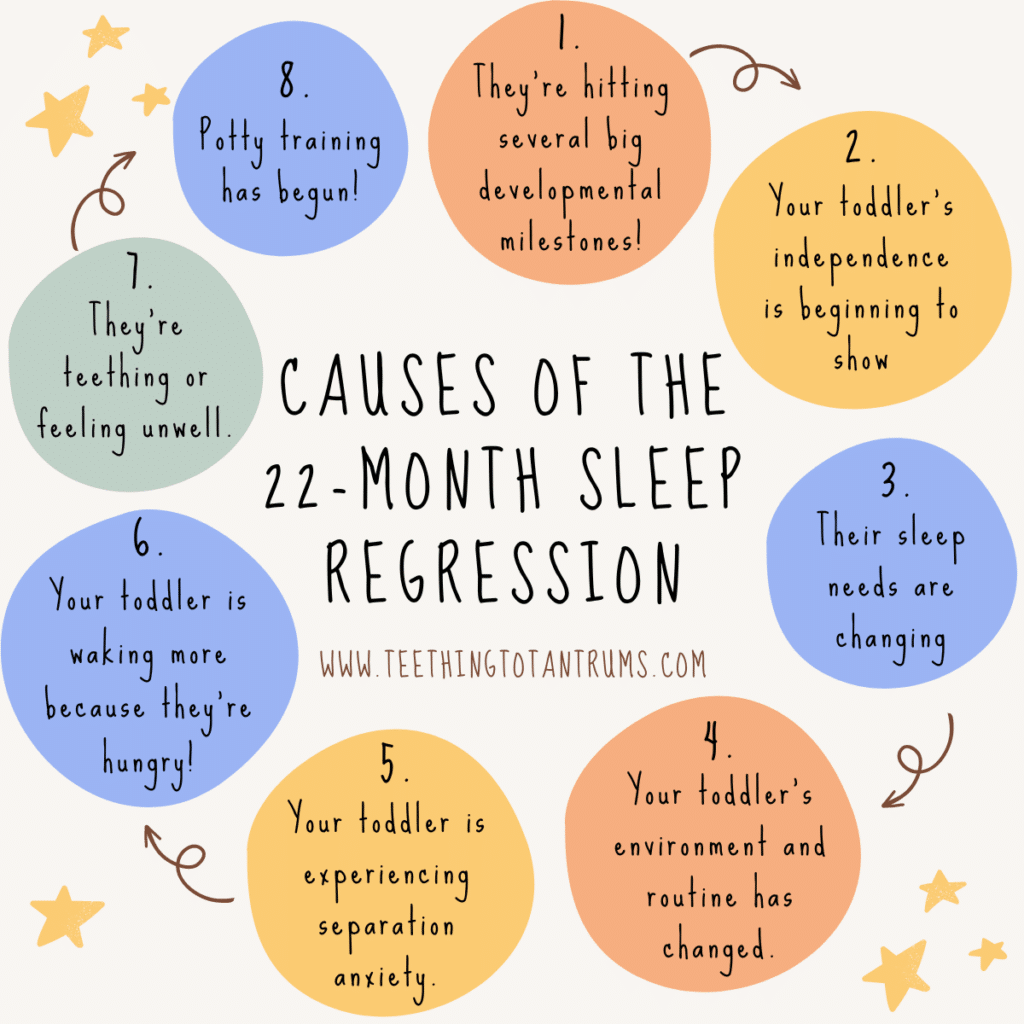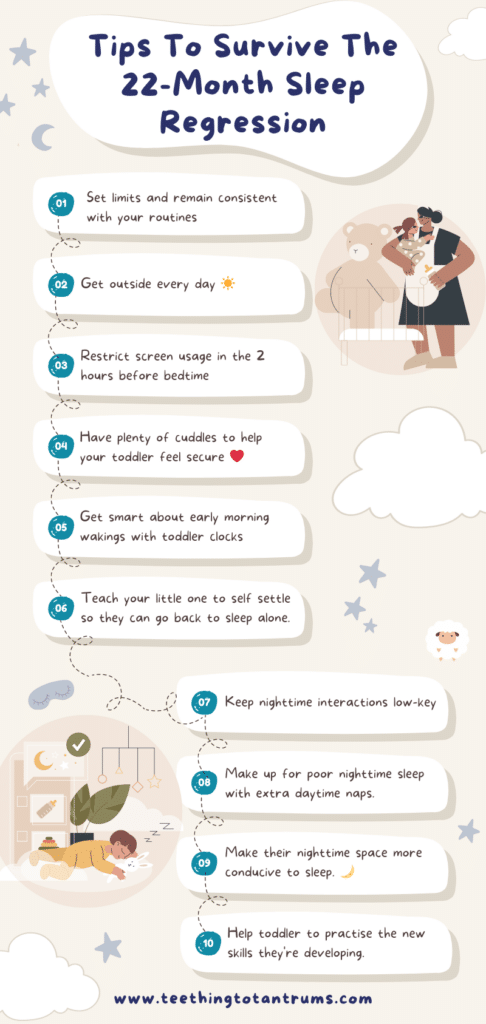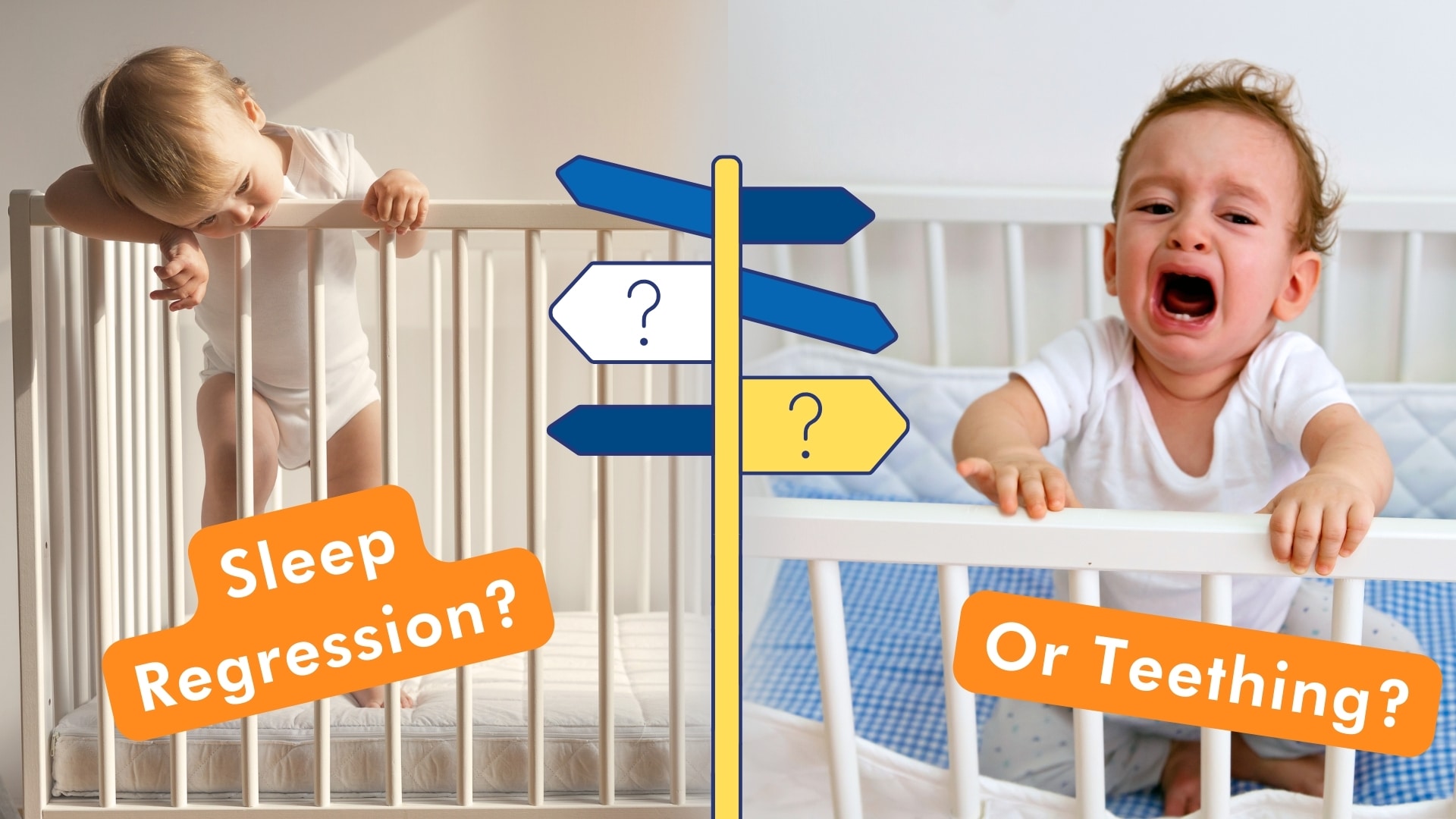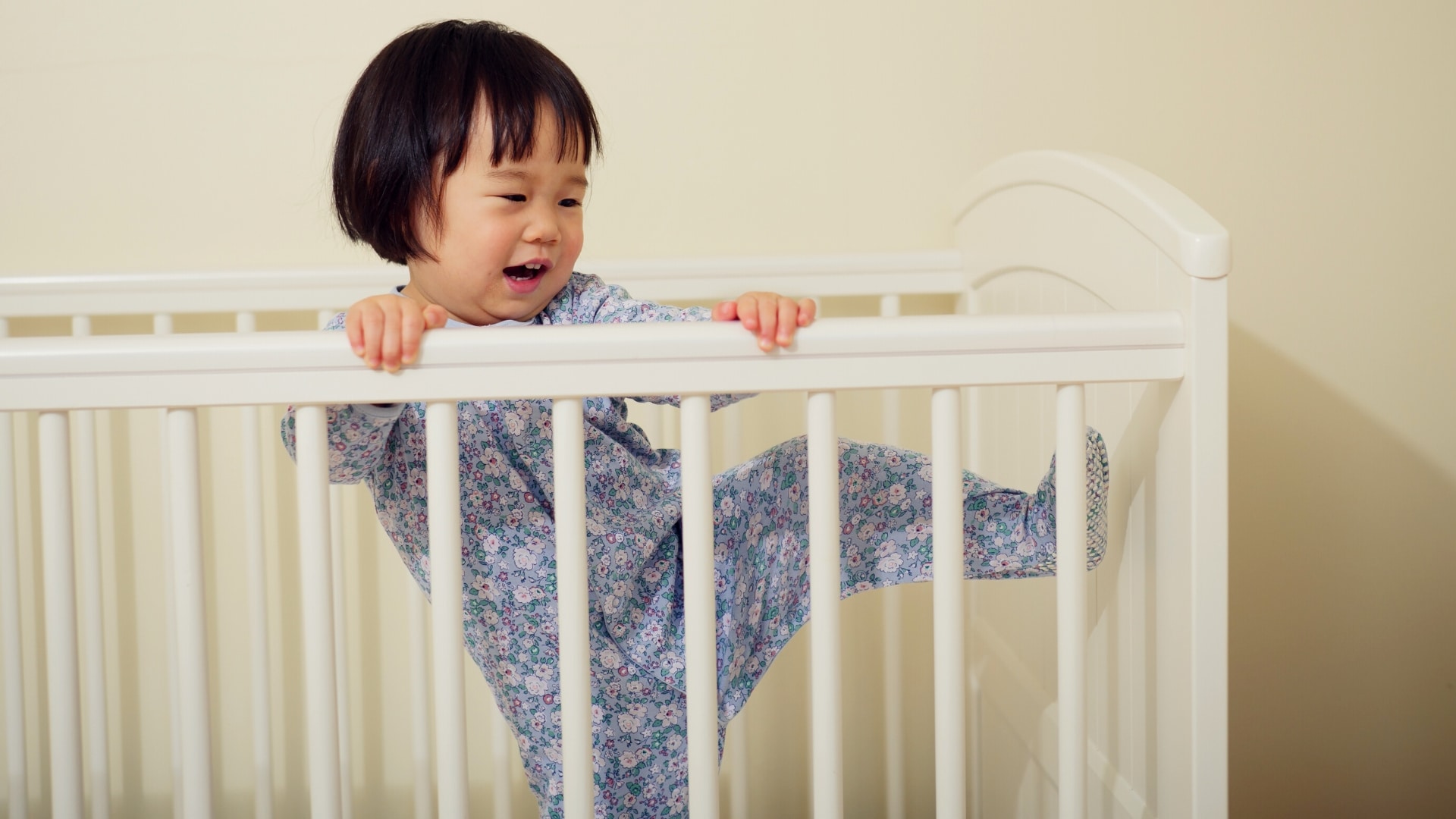Is your child suddenly fighting sleep? Being fussy? Struggling to settle? The 22 month sleep regression has arrived. Here’s what that means, and what exhausted parents need to know to get through it.
What Is The 22 Month Sleep Regression?
The 22 month sleep regression like any other sleep regression is identified by a period of time when your child’s sleep habits are disrupted usually as a result of environmental changes or developmental leaps. They may start to resist sleep, wake frequently, refuse to nap and struggle to resettle.
How Long Does The 22 Month Sleep Regression Last?
The 22 month sleep regression, like all sleep regressions, commonly lasts between 2 and 6 weeks depending on the trigger.

22 Month Sleep Regression Signs
If you suspect your little one is experiencing a 22 month sleep regression, here are some of the signs that will confirm your suspicions:
- They have difficulty falling asleep. If your 22 month old has been falling asleep nicely and then starts to regress to resisting sleep and struggling to settle then it is very likely they have hit a sleep regression.
- They are fighting nap times. While most toddlers need 2 naps a day up their 2nd birthday, some may drop to 1 nap at an earlier age. If this is the case, it is important to have a quiet time to substitute for the second nap (especially if the 1 remaining nap is not very long).
- Your little one is crying more and becoming agitated when they wake. Because a sleep regression results in less deep refreshing sleep your little one may wake in a grumpy mood and be rather fussy and unsettled.
- They wake early in the morning. Toddlers like to wake up early and anywhere between 6-8am is quite normal. However, if they are waking up as early as 5-5.30am this may indicate that they are suffering from a 22 month sleep regression.
- They wake more often at night and struggle to get back to sleep. As with finding it more difficult to fall asleep, it is typical during a sleep regression due to the change in their sleep pattern for your little one to wake more often at night. This may also affect how long they stay asleep during the day. If your little one has moved to a big bed, they may take the opportunity to get out of bed and come and find you rather than going back to sleep, as they did previously.
- They are learning new skills. If your toddler is starting to walk, and climb they will be stimulating their brain and body to the point that they find it difficult to unwind at naptime and bedtime. They will also be starting to talk at this stage and may well practice when they should be sleeping.
- Your little one is increasingly interested in their surroundings. The world is a wondrous place and as with learning a new skill, developing an interest in their surroundings means your little one’s brain is being very stimulated and may struggle to wind down for sleep
- Your little one fights sleep despite being tired. During a sleep regression, it is easy for your little one to become overtired and this can result in them fighting sleep. In addition, when learning new skills the extra stimulation can make it difficult for them to turn off and wind down to sleep.
- They are more clingy. Separation anxiety can kick in at any age. This can result in them being more clingy and not liking being left alone especially when it is time to sleep.
So, if you are nodding your head in agreement whilst reading this list… Then your little one is almost certainly experiencing a sleep regression.
Looking to get your little one to sleep quickly and effortlessly through a healthy nighttime routine? Check out my Bedtime and Nap Cheat Sheet and master the art of making daytime naps and bedtimes as seamless as possible.
A bedtime & nap cheat sheet so good your little one will ask you to put them to bed...
Laura Williams "This is a life saver! I'm so glad I downloaded your bedtime & nap cheat sheet. My little one actually asked me to put him to bed last night! Unbelievable! Thank you so much!"
Click Here For The FREE Cheat Sheet
Causes Of The 22 Month Sleep Regression
The reasons your 22 month old is going through a sleep regression are very varied. Not every reason will affect every child but here is a list of the most common causes:

1. They Are Reaching Big Physical, Mental And Emotional Developmental Milestones
A lot is going on developmentally at this age with your little one perfecting the art of walking, climbing and talking. There is a lot going on cognitively as well as they become increasingly aware of the world around them and their place in it.
And their expanding language skills will mean they can come up with all sorts of reasons why they should not go to bed. All that extra brain and body activity can easily disrupt their sleep resulting in a 22 month sleep regression!
2. Newfound Independence
Your toddler’s growing independence at this age may make them push and resist boundaries around naps and bedtimes, resulting in them becoming overtired and finding it difficult to settle and or stay asleep.
As a result, bedtimes can easily become a battleground and your toddler can easily get hyper before bed or have tantrums.
3. Their Sleep Needs Are Changing
Around this age, you may need to adjust daytime sleep, especially if newfound skills are making them more tired. If they have started daycare they may need more sleep for a while as they adjust to the new routine.
Alternatively, some 22 month olds may only need 1 long nap during the day.
4. Their Environment And Sleep Routines Have Changed
Moving house, the arrival of a new sibling, going on holiday or visiting family overnight can all trigger a sleep regression.
Any significant changes in routine could also upset an established sleep schedule such as starting daycare, parents returning to work or the primary caregiver changing.
Here is a handy video about helping your toddler navigate the arrival of a new sibling.
5. Your Toddler Is Experiencing Separation Anxiety
Separation anxiety can occur at any age and as a result, it may make it difficult for your little one to fall asleep alone and to become distressed when they wake up and discover you’re not with them.
6. Your Toddler Is Hungry
With all the increased physical activity that your 22 month old is capable of they may need more calories to keep them going. This can result in them waking more often due to hunger so you need to keep an eye on their calorie intake during the day and especially at the end of the day.
7. They’re Teething Or Unwell
Your toddler’s first molars may start to erupt at this age. If your little one is experiencing pain due to teething their sleep is very likely to be disrupted for a short while and although this is not a true sleep regression in itself, it may trigger one.
Investing in a teething toy can help soothe your toddler resulting in helping them sleep better!
And just like teething, illness may cause a sleep disruption for a short period of time and although this is not a true sleep regression, sickness can trigger a brief one as your little one may have been used to you responding to every cry or unsettled sleep while they were unwell.
8. They Have Started Potty Training
Another big developmental milestone for this age group is potty training. While some will sail through this phase, others will struggle which can result in them becoming more cranky and stubborn, especially with sleep issues.
How Much Sleep Do 22 Month Olds Need?
Your 22 month old will need about 12.5 hours of sleep in a 24-hour period. Most of this will be taken at night… however, your child will still need a 1 ½ to 2-hour afternoon nap.
Tips To Get Through The 22 Month Sleep Regression
So now that we know some of the reasons why our toddler may be experiencing a 22 month sleep regression… how can we help them through this phase?

Stick To Your Routines
I cannot stress how maintaining a healthy daily and consistent bedtime routine will help to keep you sane and keep your little one’s healthy development on track.
It goes without saying that ensuring your little one gets consistent cues in preparation for sleep will go a long way in helping your little one fall asleep during a sleep regression. And a regular bedtime and nap routine will do just that.
I know life gets in the way sometimes, but being super vigilant about nap times, meal times and bedtimes, during a 22 month sleep regression will make your life so much easier during this time.
So, if you have to cancel a few plans over the coming weeks to ensure you’re at home for naps and bedtime, it will be worth it in the long run.
Get Outside Every Day
Fresh air is a great way to ensure your toddler gets some physical exercise and an opportunity to practise their new skills such as walking, running and climbing.
Fresh air also helps to stabilize their circadian rhythm (and as a result, stabilise their sleep cycles too!).
Restrict Screen Time
Too much screen time in the lead-up to bedtime has been proven to have a detrimental effect on young children’s ability to fall asleep and stay asleep as the blue light inhibits melatonin production.
So in the lead-up to bedtime, you should avoid screen exposure for at least an hour prior to lights out.
Have Lots Of Cuddles
Sleep regressions can sometimes make your little one feel less secure. And especially if they’re teething or feeling under the weather, offering extra cuddles and snuggle time can help reassure and comfort them as they navigate this tricky phase.
Get Smart About Early Morning Waking
While it’s perfectly normal for toddlers to wake up between 6am and 7am… a 5am wake-up is not really ideal.
You can therefore, teach your little one to stay in bed a little longer by using a specially designed colour-coded clock and making sure they have something to play with in their room for when they wake in the morning.
MELLA is the #1 most backed kid's clock and all-in-one Ready to Rise children's sleep trainer designed to keep your kid in bed longer. MELLA is a sleep trainer, alarm clock, sleep sounds machine, night light and nap timer rolled into one adorable package!
Studies show that children do not fully understand the concept of time until around 8 years old, so MELLA uses colours and facial expressions to teach your kid when it's time for bed and when it's okay to wake up. With MELLA, your kid can learn to stay in bed longer, giving you more sleep!
Teach Your Little One To Self-Settle
If you have not done so already, try and teach your little one to self-settle. Allow them to spend time playing in their cribs or a playpen during awake times and put them down whilst drowsy and not fast asleep.
Keep Nighttime Interactions Low-Key
If your little one wakes at night then it’s super important to keep your interactions low-key. Have the lights down low and do not chat to
them. A night light is a great investment as it stops you from having to turn on a light when visiting them at night.
Finding the right night light for your child can be quite a task. You want something safe, comforting, and practical. The Cozy Starry Night Light ticks these boxes, with eye-friendly warm lighting and an easy-to-use dimmer.
Its gentle glow makes it the best night light for feeding baby, diaper changes, or comforting your little one back to sleep.
As your baby grows the Cozy Starry Night Light's starry sky projection can provide comfort and gentle quiet time stimulation. Its soft lighting ensures a dreamy, peaceful environment, supporting your baby’s natural sleep cycle.
It really is a fantastic nightlight (at a very reasonable price!)
- Eye-friendly warm lighting with adjustable brightness.
- Includes a timer function for convenience.
- Projects a starry sky that is soothing for little ones.
- Rechargeable battery, so it's very portable.
- A USB adapter is not included for charging.
- The star projector is static without motion (however, this is ideal for very young babies and toddlers).
- Battery life varies based on the brightness settings.
Make Up For Poor Nighttime Sleep With Extra Naps During The Day
This can be a tricky phase when it comes to naps and you might be tempted to drop naps in the hope that your toddler will be more tired for bed and sleep better at night.
However, as I say over and over, less daytime sleep does NOT mean better nighttime sleep.
In fact, the complete opposite happens.
An overtired toddler is not going to go to bed peacefully or quietly.
Their bodies will be stressed and full of adrenaline…
And this is not ideal when getting ready for bed because your little one will be hyper instead.
If your toddler is transitioning from 2 naps to 1, you need to make sure that their nap is taken at a consistent time each day (preferably after lunch) and that they have had an adequately active morning to be ready for sleep.
REMEMBER: Let your little one sleep whenever they need to during the day to avoid them becoming overtired. Short cat naps are ideal to help your toddler get through to bedtime.
Make Their Sleep Space More Conducive To Sleep
Now your little one getting older they will be more easily woken by sleep distractions and noise. So, darken the bedroom using blackout blinds and use a nightlight.
During a 22 month sleep regression your little one needs to be sleeping in a calm, dimly lit room.
Using a white noise machine can eliminate background noise from disturbing their sleep too. They will help to ensure that sudden changes in noise will have less of an impact on your sleeping toddler.
White noise machines are a game-changer for your little one's sleep and having one that plays all night is a must. With a long-lasting battery, this compact and stylish white noise machine contains 21 non-stop relaxing noises, which will lull your little one to sleep night after night, no matter where you are!
Help Your Little One Practice New Skills
It is important that you give your toddler plenty of opportunity to practice any new skills during wake times so that they are not desperate to do so when they should be sleeping.
Provide them with toys to help them walk, opportunities to learn to climb safely, play with construction toys such as building blocks and try simple puzzles too.
Read lots of books to encourage speech and cognitive development.
Possibly the most comprehensive wooden block set ever created!
This beautiful and brilliantly designed wood block set promotes spatial, language, and problem-solving skills through bright and solid wood building blocks, planks, shapes, people, magnetic wheels and dowels with a toggle string. All are safely kept in a wooden storage box and a cotton drawstring bag for storage at the end of a busy day!
Frequently Asked Questions About The 22 Month Sleep Regression
Looking for more information about the 22 month sleep regression? Check out the most commonly asked questions here.
Why Is My 22 Month Old Suddenly Waking At Night?
If your 22 month old has been sleeping beautifully and suddenly starts having more night wakings this may be due to a number of reasons including teething, achieving a developmental milestone, starting day care or changing sleep needs.
While you should always rule out any illness that may be affecting your little one, if all is well then you should deal with your little one’s nighttime waking and or nap resistance as a toddler sleep regression and follow the tips listed above.
How Will I Know When The 22 Month Sleep Regression Is Over?
When your toddler settles back into a settled sleep routine consisting of regular daytime naps and bedtime with little to no waking at night, you can safely say that the regression has passed.
Why Won’t My 22 Month Old Go To Sleep?
It is very common at 22 months for your little one to experience separation anxiety and as a result, they will find you leaving them at bedtime, nap time and coping with nighttime wakings very difficult.
In addition, if you have not yet taught your little one to fall asleep alone they will not like it if you have now decided that they should do so.
Overtiredness which manifests itself as hyperactivity will also cause issues at bedtime and you may need to take a close look at your little one’s nap schedule and wake windows.
Finally, if your little one is exposed to screens in the two hours leading up to bedtime this may also be the reason they are struggling to fall asleep.
What Is The Average Bedtime For A 22 Month Old?
I recommend a regular bedtime between 6.30pm and 7.30pm. But a bedtime anytime between 6-8pm is fine for this age depending on their daily schedule and your family routine. The most important thing is that bedtime is at the same time every night.
What Can I Give My 22 Month Old To Help Them Sleep?
In order to help your toddle to sleep you can offer them any or a combination of the following:
- A favourite pacifier
- A favourite cuddly toy or blanket
- Leave on a night light
- Play an audiobook
- Use a ceiling projector
I would not recommend any kind of sleeping sedative (even natural) at this age. Rather try the suggestions in this post to ensure your little one has the best opportunity to be primed and ready for sleep.
When Do I Need To Talk To A Doctor About The 22 Month Sleep Regression?
If you are unsure if your little one’s change in sleep patterns is due to a sleep regression, watch for the following signs. If they are present then you should consult a doctor:
- Abnormal breathing or snoring during sleep
- Weight loss
- Poor appetite
- Major changes in urination or bowel movements
- General lethargy or weakness
If your little one has a persistent fever or a cough which is waking them at night you should also consult a medical practitioner. I would also recommend seeking medical advice or a sleep consultant if your little one’s sleep issues continue for more than 6 weeks.
What Does A 22 Month Old Sleep Schedule Look Like?
A 22 month old will take 12-13 hours of sleep at night and have about 1 to 2 hours of sleep during a daytime nap. To learn more about the 22 month old sleep schedule click here: 2 Year Old Sleep Schedule.
Further Reading
If you would like to learn more about sleep regressions and how to handle them at different ages, check out these posts:
- Sleep Regression: What, Why, Signs & Sanity-Saving Solutions
- 2-Year Old Sleep Regression
- 2.5 Year Sleep Regression
- 3 Year Sleep Regression
Need More Parenting Help?
- Download our FREE Bedtime & Nap Sleep Cheat Sheet. It’s a free, easy-to-use and proven formula designed for parents of 0-5 year olds to master the art of consistently undisturbed and restful sleep without the yelling, nagging or exhausting long-winded evenings.
- Check out our Parenting Toolbox. You’ll get access to expertly-chosen products that you can guarantee are the best for your little one and your wallet.
- Are you looking for personalized guidance to navigate the challenges of parenting? I offer 1-on-1 consultations to bring you tailored strategies and actionable advice to help support your child's growth and well-being with confidence.

A bedtime & nap cheat sheet so good your little one will ask you to put them to bed...
Laura Williams "This is a life saver! I'm so glad I downloaded your bedtime & nap cheat sheet. My little one actually asked me to put him to bed last night! Unbelievable! Thank you so much!"
Click Here For The FREE Cheat Sheet






